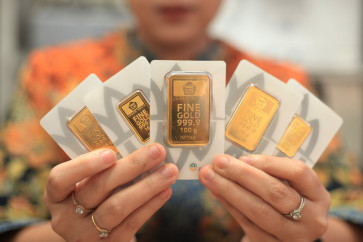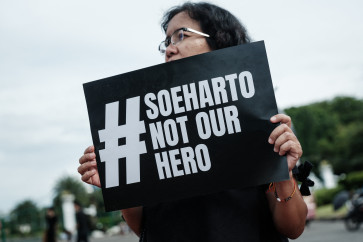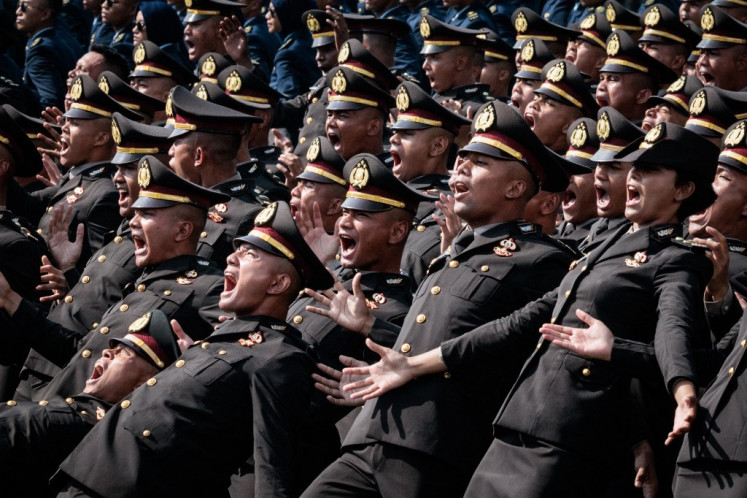Popular Reads
Top Results
Can't find what you're looking for?
View all search resultsPopular Reads
Top Results
Can't find what you're looking for?
View all search resultsVictims, artists use social media to highlight sexual harassment
Concerts allow music fans to come together and enjoy the performances with friends or family
Change text size
Gift Premium Articles
to Anyone
C
oncerts allow music fans to come together and enjoy the performances with friends or family. However, these events, with large crowds pressed together, are also becoming known for incidents of sexual harassment.
With the growth of the #metoo movement, more victims of sexual harassment at music concerts have come forward to share their experiences, including 22-year-old Fattwa Pujanggawati. She took to Twitter to share her story of being sexually abused during a performance of rock band .Feast in Bekasi, West Java, on Saturday.
As the story went viral, fellow concert-goers and music enthusiasts shared their own experiences with The Jakarta Post.
Gaby Swastika, 30, a music enthusiast living in East Java’s Surabaya, recalled an incident at a concert 10 years ago when she was still a student in Yogyakarta.
“I was with my younger cousin, also a girl, watching The Changcuters’ show at a school. We were standing in the front row when the crowd began dancing wildly and I was separated from my cousin. Afterward, I felt someone touching me twice,” Gaby said over text message on Monday.
“I was shocked. I looked for my cousin in the crowd and then we left. Afterward, she told me that she was also groped.
“At the time, I felt guilty. I blamed myself for looking for trouble by dancing at the front row. Now, I feel angry because I know it was not my fault and that kind of incident should never have happened at a concert or anywhere.”
Gaby said she had tried to repress the traumatic memory of being groped, but all her anger and fear resurfaced when Fattwa’s story went viral.
Rampant sexual harassment does not only happen in the audience but also to musicians on stage.
A bass player of a punk band — who wishes to stay anonymous — said she was groped during a show at an underground venue on Jl. RS Fatmawati, South Jakarta, in 2017.
“When my band played, a lot of people climbed onstage and danced along,” she said in a text message to the Post.
As the situation became more chaotic, she fell off the stage and was hit by her instrument. As a friend took her hands to lift her up, someone in the crowd groped her.
“I know the difference between an innocent touch and [unwanted] squeeze,” she said. “Afterward, I tried to continue the show though I was so upset and shocked. I could only bring myself to tell my friends about what happened the next day.”
She said the incident had left her so troubled that she had to see a therapist.
Another incident involved Adi, not his real name, who was harassed during a metal band Death Vomit show at Yogyakarta State University Sports Hall in 2009.
Adi, then 17, was crowd-surfing when he felt his private parts being squeezed by someone in the crowd.
Adi remembered he took the incident rather lightly.
“I was shocked, but I was okay. I did not feel like a victim,” he said. “However, I became more aware of the threats within the moshpit. Now, I try to keep a safe distance from girls, including staying clear of unintentional contact, during moshing to avoid making them uncomfortable.”
Baskara Putra, the lead singer of .Feast, said that he received numerous reports of sexual harassment happening at the band’s shows after the incident on Saturday went viral.
On Sunday, the musician shared a GIF of an SOS sign on a red background as a warning.
The image is a sign for performers, security officials or organizers to indicate that there are people who need help for incidents such as suffocating, violence, pickpockets or sexual offenses,” Baskara said in a statement. “The red SOS sign was chosen as it can be easily recognized by crew members on stage or behind the barricade, compared to flashlights or hand signs,” he said.
The sign was also shared by fellow musicians, including Kunto Aji and The Panturas.
The movement, however, was challenged by some music enthusiasts.
Zara Zahrina, 24, said the sign might not be effective and would only pose a greater threat to potential victims.
“The red screen might not work in a big crowd,” Zara told the Post on Monday. “It can also be a scary situation as the victim would not be anonymous anymore and the offender might locate the victim somewhere else and retaliate.”
Zara suggested a hotline number in case of emergencies.
“The number should be displayed on stage before the show. Then, if anyone falls victim to an incident, he or she can contact the number. The method has been practiced by [American rock bands] Speedy Ortiz and Modern Baseball. It’s safer as more discreet,” Zara said.
She expressed her regret over how most music organizers in the country do not think women are at greater risk at concerts.
“[These incidents] can affect the music scene badly. Just coming to shows can pose a risk [of sexual harassment] and it discourages women from being more involved in the scene as, for example, musicians, stage managers or engineers,” she said. “In the end, the music scene would end up being male-dominated.”
Zara also lamented how some male musicians resorted to gatekeeping, or preventing girls from joining the moshpit, instead of making a space safe for all audience members.
“A lot of men in the [music] scene have good intentions, but they do not understand the power relations and imbalance involved. They end up gatekeeping and dictating [to the girls],” she said.
Tomo Hartono, 29, singer of post-hardcore band Rekah, noted that Baskara involved just one female musician, Danilla, in the cause.
“Of course it is a good initiative, but it’s also poorly executed as he did not involve more female musicians in coming up with a solution,” Tomo said.
“Men in the scene should not take up the space that should be filled by vulnerable groups. I think men should do their part by confronting their friends who are sexist and misogynist, as there are still so many in the industry. Don’t bother with a social movement if you still enable your problematic friends to be predators.”
He said rape culture, sexism and misogynistic views are still rampant in the music scene and many men with power were getting away with their bad behavior.
“Even in small, community-based shows, there are predators who give girls drinks and rape them afterward. One of my close friends was a victim once,” he said.










